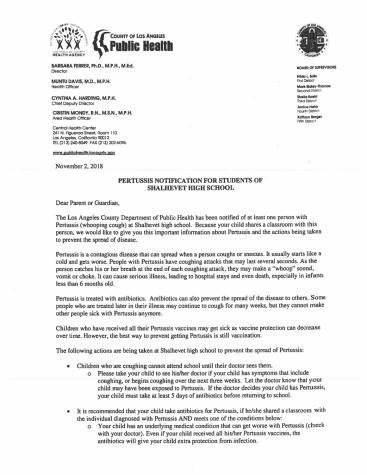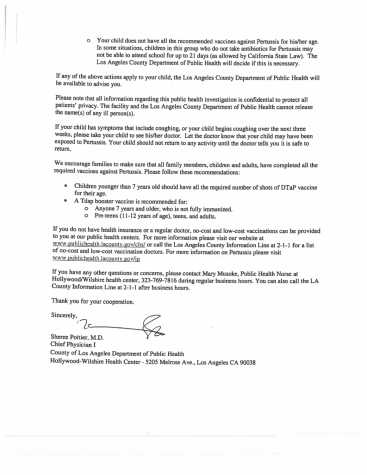Shalhevet students should not babysit infants until Nov. 30, Health Department official recommends
Small pertussis outbreak is not dangerous to teens, but symptoms are same as for a cold so babysitters could transmit to babies, who are vulnerable
SAFE: Dr. Julie Higashi, an infectious disease specialist and assistant health officer with the Los Angeles County Health Department, said Shalhevet students should stay away from teachers’ babies until the pertussis outbreak is over. Seven staff members now have babies under the age of 1.
This past month, there have been two cases of pertussis, also known as whooping cough, among Shalhevet students. While pertussis is not life-threatening for teenagers, there is another demographic at stake — babies under the age of one — a group many students at school babysit frequently.
Babies who contract pertussis experience a much more serious illness. According to the federal Centers for Disease Control (CDC), about half of young babies with whooping cough end up in the hospital, and can get pneumonia. Some of them die.
Dr. Julie Higashi, an infectious disease specialist with the LA County Health Department recommended that therefore, Shalhevet students not babysit children under the age of one until 21 days after the last case at school has been diagnosed — at the moment, Nov. 5 — after which the outbreak will be considered over.
“You can be infectious even before you feel sick,” Dr. Higashi said. “As far as pertussis goes, there’s an initial phase that’s roughly seven to 10 days that’s like a normal cold.”
Because pertussis symptoms can be hidden in the initial stage, student babysitters should monitor themselves for any cold-like symptoms — especially if they babysit for their teachers, she said.
Seven Shalhevet faculty members have babies less than a year old, and some employ students as babysitters in their homes.
“What I would advise is that those students don’t babysit until the outbreak is over,” said Dr. Higashi, who is the mother of junior Kiku Shaw. “If they’re symptomatic, I would advise them to get tested and treated. It’s not critical that they babysit.”
Treatment is with antibiotics, taken for just a few days even though symptoms of the illness last longer, she said.
“Sometimes you might be infectious, and you might be developing pertussis but not yet know that you’re truly ill,” she said. “If you’re asymptomatic” — that is, without any symptoms — “and you’re a babysitter, I don’t think you should babysit.”
“Sometimes you might be infectious, and you might be developing pertussis but not yet know that you’re truly ill.
— Dr. Julie Higashi, LA County Health Department
Parents were alerted of the outbreak by emails sent on Oct. 29, Nov. 5 and Nov. 8, and were urged to take students to the doctor if they showed symptoms.
Checking out seemingly mild colds and coughs may seem extreme, but Dr. Higashi said it’s actually the best way to prevent the spread of this disease.
She said students with colds would be treated immediately with antibiotics if it seems likely they’ve had contact with one of the known pertussis cases.
“The important thing is understanding whether or not they’ve potentially had contact with the two cases, and making sure they’ve gotten vaccinated,” she said. “Because if they didn’t get vaccinated and we think they did have contact, then they should get prophylaxis” — that is, antibiotics for prevention — which means it doesn’t matter if they’re symptomatic or not, they just get medicated.”
Under state law, all students in California high schools must be vaccinated against pertussis, but the vaccines wear off over time.
Dr. Higashi said that being revaccinated would not help to contain an outbreak of pertussis — although it would for other illnesses — and in this case parents should focus more on watching for symptoms.
“Pertussis for healthy teenagers is really a nuisance more than a real health threat,” Dr. Higashi said. “For a school to have one or two cases does not mean that everybody should be revaccinated [because] it’s not a high-risk population. But we do need to be careful and be mindful about being sick, and not coming to school when you are sick.”
Because of the danger for babies, pregnant women are now re-vaccinated against pertussis — a policy recommended by the federal Centers for Disease Control (CDC) since 2012.
“All pregnant women need to get vaccinated in the third trimester, and anybody in the household, or who will be taking care of the baby,” Dr. Higashi said. “The idea is to get all those people vaccinated at least two weeks before the baby comes.”
Senior Josh Sarir was the first student diagnosed with pertussis. He missed a week of school and took antibiotics before his cough was not contagious anymore. His return to school has been difficult, he said — and he was told that his symptoms would last for the next three to six months.
“It’s been not the easiest thing dealing with all the coughing during school because it’s draining,” Josh said. “School itself and dealing with the coughing.”
Josh is co-president of the Choirhawks, and said his illness has impacted more than just his immune system but his hobbies and social life.
“In choir I can’t sing for three seconds straight without getting a cough attack, and I can’t sing for at least this month and next month,” he said. “Hanging out with friends after Shabbat is harder, because when it starts to get dark around 5 or 6 is when the coughing gets bad, because I’ve been talking all day.”
Josh said he has found ways to cope with the cough attacks at school.
“In the morning, if the cough’s really irritating me, I won’t talk during davening, and I won’t talk during first period,” he said.
Shalhevet teachers said they would follow Dr. Higashi’s advice, although they do not use student babysitters often anyway. They had not been aware that students could be contagious even if they seemed to have only a cold, or if they were not yet sick.
“Now that I know that, it seems like very sound advice for me not to have Shalhevet students in my house for the next few weeks,” said Dean of Students Rabbi Ari Schwarzberg said, whose youngest son is three months old.
Rabbi Yagil Tsaidi’s son just turned one according to the Hebrew calendar. He said his family would not use a Shalhevet babysitter again until the pertussis is fully cleared up.
“It’s better to take the safe route,” Rabbi Tsaidi said in an interview.
Shalhevet Chief Operating Officer Ms. Sarah Emerson said the school has been in close touch with the Health Department since the first case was diagnosed.
“We did research because we were concerned and we wanted to know what was going on,” Mrs. Emerson said. “A doctor explained to me that the vaccination wasn’t great, so it’s not surprising that there could be breakthrough cases.”
 Ms. Emerson sent three emails to Shalhevet parents: on Oct. 29 alerting them of the first pertussis case; on Nov. 5 forwarding a letter from the Los Angeles Health Department informing parents of symptoms and steps to take; and on Nov. 8 informing them of the second case, with the Health Department letter again attached.
Ms. Emerson sent three emails to Shalhevet parents: on Oct. 29 alerting them of the first pertussis case; on Nov. 5 forwarding a letter from the Los Angeles Health Department informing parents of symptoms and steps to take; and on Nov. 8 informing them of the second case, with the Health Department letter again attached.
The Health Department letter described the symptoms, and stated over the next few weeks, a cough may not be just a cough.
“Children who are coughing may not attend school until their doctor sees them,” says the letter signed by Dr. Sheree Poitier, Chief Physician 1 of the Los Angeles County Department of Public Health. “Let your doctor know that your child may have been exposed to pertussis.”
It said that students should take antibiotics if they were not up to date on pertussis vaccines or had underlying medical conditions that could worsen with pertussis.
“People with pertussis may have coughing attacks that last several seconds,” the letter said. “As the person catches his or her breath at the end of the coughing attack, they may make a “whoop” sound, vomit, or choke.”
Dr. Higashi explained that of the various levels of infectiousness of organisms, pertussis is a droplet disease, meaning that it is contagious to anyone who has been within five feet of someone who has it.
Get the latest from The Boiling Point. Sign up for our news feed.
Ms. Emerson said the administration is in contact with the Health Department to get recommendations for further measures to prevent future pertussis cases. She said that Shalhevet can only recommend, but not cannot require, that people update their vaccines.
“Shalhevet recommends that all students faculty staff and parents for that matter stay current on their vaccinations,” she said. “We’re actively working with the Health Department, we’re going to see what kind of thing they recommend.”
Staff writer Caleb Fishman contributed to this story.

Lucy Fried was co-editor-in-chief during the 2018-19 school year and went on to study at the Hartman Institute in Jerusalem. She is now a junior at UC Berkeley.












